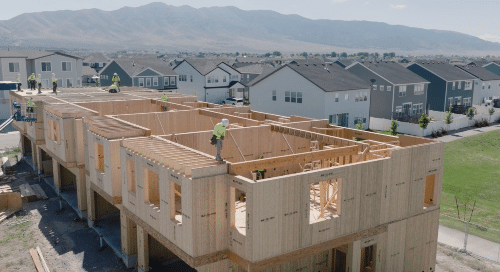Rapid urbanization and a growing demand for efficient construction methods have resulted in Modular Construction. Modular construction is an innovative building method that involves construction sections, or “modules,” of a building off-site in a controlled facility environment. The modules are then transported to the construction site for assembly and final structure. While the approach contrasts with traditional on-site construction, industry standards, and codes are maintained. This type of approach is versatile and applicable to various building types, from residential homes and commercial buildings to educational facilities. Its rise in popularity is driven by the demand for faster construction timelines, reduced environmental impact, and the ability to maintain high-quality standards through a controlled manufacturing process.
In Arizona, thunderstorms occur year-round and are more common during the “monsoon” season from mid-June to September. With heavy rain, flash flooding, dangerous winds, hail, dust storms, and lightning, these types of storms can pose a risk to construction workers on the job and monetary impacts requiring extensive planning. By manufacturing building components off-site in controlled environments, projects can be completed significantly faster compared to traditional methods. The reduced construction time not only meets tight deadlines but also translates to substantial cost savings. With modular construction, 60-90% of construction is completed inside a controlled environment, according to the Modular Building Institute, which reduces the risk of weather delays and other environmental factors.

Source https://www.autodesk.com/design-make/videos/project-phoenix-modular-housing
As sustainability becomes a top priority in the construction industry, modular building aligns seamlessly with eco-friendly practices. With the ability to assemble and disassemble, these modules can be relocated or refurbished, reducing the use of raw materials.
Reduced material waste, energy efficiency in controlled manufacturing environments, and the ability to recycle components contribute to a smaller environmental footprint, making modular construction a sustainable choice for the future.
With Phoenix experiencing a constant influx of residents, modular design offers a practical and timely approach to meet the housing demand. By streamlining the construction process and minimizing on-site disruption, modular housing offers a pathway to more accessible and swiftly built homes. Modular construction also provides a solution to logistical challenges in densely populated urban areas where space is premium. The ability to assemble structures on-site quickly following the same building codes and traditional architecture with minimal disruption is a boon for projects in city centers, enabling construction in areas with limited accessibility.
Contrary to the misconception that modular buildings lack design for diversity, the reality is quite the opposite. Modular construction offers a wide range of design possibilities, allowing architects and builders to customize structures according to specific project requirements. From residential homes to commercial complexes, the flexibility of modular building is reshaping the architectural landscape.
The versatility, speed, and environmental consciousness inherent in modular construction mark it as a game-changer, resonating with the demands of our fast-paced world. As we embrace this evolution in building practices, we embark on a journey where construction is not just a means to an end, but a reflection of our industry’s commitment to a smarter, more innovative future.
The Greater Phoenix Chamber Foundation’s Construction Workforce Initiative, Build Your Future Arizona’s mission is to create a sustainable and skilled craft workforce by creating awareness about high-paying construction careers, training opportunities and mapping career paths to employment in these high-demand occupations.